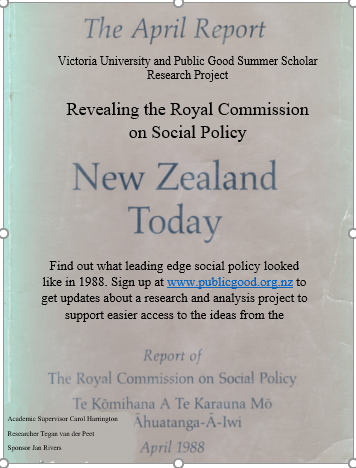The Royal Commission on Social Policy (1986-88) was an initiative of the Fourth Labour government. The Royal Commission was in some ways an attempt to counter the measures the Government were taking to cut and privatise public services, remove worker protection and subsidies, and to demonstrate that there was good social policy and humane economic policy at the heart of the Labour government.
The Commission carried out extensive public consultations from which were developed new socially progressive perspectives . Although it was not directly influential at the time it’s its findings have permeated subsequent thinking on social issues such as Treaty thinking and bicultural perspectives, well-being measurement, adopting social and environmental measures to complement economic measures, such as GDP. Its authors, the Commission’s staff many of them in their earlier careers, and other participants have become significant actors in subsequent public policy in NZ. The content makes the published report highly relevant for policy staff, NGOs and others in the current political environment where these issues are once again at the top of the public policy agenda.
The project
This page will contain the resources created by the work of the Victoria University Summer Scholarship project “Revealing the Royal Commission on Social Policy”.
Material already created includes the following:
a) The Royal Commission : A Potted History including links to the authors and commission staff
b) The Royal Commission Table of Contents and List of Authors
Outline of the project.
c) The S-Factor (the spiritual / something or taha wairua factor) Catherine Benland’s paper on the role of spiritual / transcendent perspectives in public policy.
d) Rangatahi / Young people. Can they be hopeful again?
This list is from the chapter on youth developed by the National Youth Council contains principles and ideas for what should be contained in a National Youth Policy.
Project Title
Revealing the Royal Commission on Social Policy 1988.
Project Detail
This project aims to produce an historical resource for students and scholars interested in New Zealand’s Royal Commission on Social Policy, and to expose its recommendations, thinking and associated materials for the broader public of New Zealand. We aim to produce bibliographies of writing about the Commission and of public submissions to the Commission. Since the political pressures of the day meant the final report was published in a rush before the consultation was completed. We also aim to create an annotated listing of the Commission’s recommendations and to create a table of contents with an abstract for each chapter. We also aim to gather perspectives from those who worked on or contributed to the commission: what their hopes for it were and how they understand its subsequent influence on New Zealand’s politics and policy. There is an exploratory aspect to this research and the summer scholar may pursue emerging themes of interest as they are discovered and write a brief paper about them.
- Create an annotated bibliography of the writing about the Commission following its publication.
- Create a second bibliography of related materials such as published submissions.
- Create a series of chapter summaries.
- Create an annotated listing of all of the recommendations in the 5 volumes of the report adding to complement the chapter summaries.
- Identify and interview 5 of the original authors and capture their thoughts about the RCSP 30 years on.
- Present some aspects of the information in a software tool that allows the content to be navigated to see patterns in the content. (The intention is to create a topic map of the content of the report together with associated keywords using the digital humanities machine learning tool Mallet.
If you would like to be kept up to date with the work of the project you can register your interest using the email box at the bottom of the page.
If you would like to donate to the ongoing work please email ask @<publicgood<dot>org<dot>nz> for details of the Public Good Bank Account.


Latest Comments